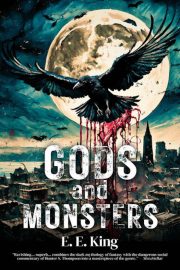ROMANCING SFF: Why Romance Should Be Part of Your Worldbuilding
by R. K. Thorne
Worldbuilding is a fun aspect of writing fantasy and science fiction. It is so tempting to get lost in drawing maps, hoarding pictures, plotting lineages, or researching how that awesome weapon system could actually work.
Our efforts often focus on geography, history, and politics. But part of worldbuilding should be envisioning the culture around romance in your world: how it works and how it influences the lives, families, and civilizations of your characters. It may even include the lack of romance and its implications.
As a genre, romance is defined as a story focused on a relationship with an optimistic ending. Romance can be a genre, the core of your plot, a minor subplot, or element of the background.
Whether its role is big or small, understanding how your characters fall in love is a critical part of fleshing out your newly wrought world. How can attraction, courtship, commitment, and partnership shape your worldbuilding?
Attraction
Real attraction is about what a character or a society values. Attractiveness has morphed across human history. Fashion, beauty, and cultural standards are constantly evolving. So what do beings in your fantasy or sci-fi civilizations find attractive? Why? What does that say about what is important to them?
This should include physical appearance but also personality, sense of humor, profession, and beliefs about life and the world. For example, archetypal elves might find slender, pale beauty alluring or maybe skill in art, poetry, or song. Classic dwarven attractiveness might value strength, vivacious curves, fortitude, or a sense of humor.
Magic and technology can play a powerful role: altering appearances in small and large ways or even transforming characters into other creatures. Does technology smooth imperfections—or scar your heroes for life? How does that change their relationships? How does a veteran’s wounds or a shapeshifter’s dragon form reveal the inner truth of his character?
Rare or expensive things can shape beauty standards. What commodities are rare in your world? How might that influence clothes and personal statements of status and wealth?
A word of caution: beware the pitfall of making beauty signify “good guys” and unattractive signify “bad guys.” In fact, if your world has only one type of beauty it finds attractive, keep going, it’s not rich enough yet.
A thriving world will have groups with different values. Intellectuals, wizards, or inventors will prioritize different qualities in a partner than would merchants or pirates, politicians or carpenters, soldiers or priestesses.
Courtship
Your characters entering into a relationship is a gold mine of ways to show off how your world works. Are there formal courtship ceremonies or informal agreements? Is it public, private, or maybe even secret? Short or long? Do they skip courtship all together, such as in an arranged marriage? How does who they are come out in how they approach relationships?
Indeed, courtship is a popular fantasy romance premise for a reason.
Commitment
Rites and rituals of commitment can reflect the larger values of a civilization. Is there a grand, formal public ceremony or a simple agreement? How many people make up a commitment? Are ceremonies large or small, public or private?
In my own work, I’ve written about weddings that allowed only two partners and the officiant under moonlight, a ritual born out of that culture’s value of sincerity and authenticity. Other cultures had large joyous celebrations reflective of their love for family and community.
Their cultural values permeate their rituals.
Partnership
What do partnerships and families look like in your world? Is a partnership built on romantic love common or rare? Do partners live together? Share finances or household duties? If there are children, how do partners share responsibilities? Are children an important part of a partnership? Why or why not?
The Absence of Romance
Even the absence of romance in a traditional sense shapes a world. Some people aren’t interested in emotional or physical romantic relationships. What if this were the default in your world? Would it change the structure of families? Your economy? To inform your ideas, consider learning about asexual and aromantic experiences of people right now.
Conclusion
So if you feel like romance just isn’t a part of your world, maybe take another look. Romance can offer unique ways to make your world feel truly alive, and it can open up options for conflict for your characters. After all, we are all fools in love. And fools in love can do just about anything. Which makes for great plot twists.
Romantic relationships can be some of the most important and life-changing relationships people have. Neglecting them will leave part of your world lacking the vibrancy of real life. Embracing them can open up a world of ideas.
Happy worldbuilding.
 R. K. Thorne is the author of ten novels of romantic fantasy and science fiction that’s full of action, humor, and optimism. She’s fueled by her addiction to notebooks, role-playing games, coffee, and imperial stouts. She lives in the green hills of Pennsylvania with her family, one pup, and two gray cats that may or may not pull her chariot in their spare time.
R. K. Thorne is the author of ten novels of romantic fantasy and science fiction that’s full of action, humor, and optimism. She’s fueled by her addiction to notebooks, role-playing games, coffee, and imperial stouts. She lives in the green hills of Pennsylvania with her family, one pup, and two gray cats that may or may not pull her chariot in their spare time.



